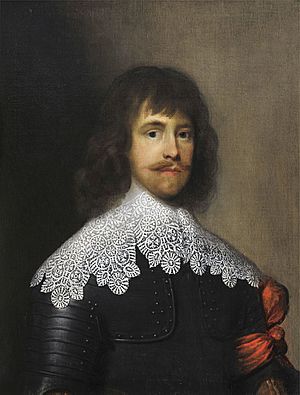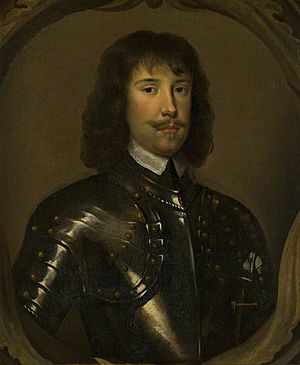Richard Herbert, 2nd Baron Herbert of Chirbury facts for kids
Richard Herbert, 2nd Baron Herbert of Chirbury (born around 1604 – died May 13, 1655) was an important figure in England and Wales. He served as a Member of Parliament, which means he was elected to represent people in the government. During the English Civil War, he was a Cavalier, meaning he supported King Charles I. He fought as a colonel in the King's army. He also held a noble title, Baron Herbert of Chirbury, which made him a peer and a member of the House of Lords. However, the House of Lords was later closed down for a time.
Richard Herbert's Life Story

Richard Herbert was born around 1604. He was the older son of a famous poet, Edward Herbert, 1st Baron Herbert of Cherbury. His family's main home was Montgomery Castle. Richard's mother was Mary, who was the daughter of Sir William Herbert. Both of Richard's parents came from a branch of the same family as the Earl of Pembroke.
In 1627, Richard married Lady Mary Egerton. She was one of five daughters of John Egerton, 1st Earl of Bridgwater. Richard and Mary had two sons, Edward and Henry, and two daughters, Frances and Florence.
Richard was a strong supporter of the King, known as a Cavalier. In March 1640, he was elected to the House of Commons for Montgomeryshire. Later that year, he was elected again for Montgomery.
When the English Civil War began in 1642, Richard was made the Royal Governor of Bridgnorth. He spent his own money to create an army for the King. He raised a group of foot soldiers (an infantry regiment) and a group of horse riders (a troop of cavalry). Because of this, the King gave him the rank of colonel.
On October 12, 1642, Richard was removed from Parliament. This happened because he followed the King's orders to raise an army in Shropshire and joined the King in Oxford. In 1643, he earned a Master of Arts degree from the University of Oxford. He also became the Governor of Ludlow.
In July 1643, Colonel Richard Herbert and his regiment helped Prince Rupert of the Rhine capture the city of Bristol.
In September 1644, Richard's father, Lord Herbert, gave up their family home, Montgomery Castle, to the Parliament's army. His father then went to London and made peace with Parliament. He received a weekly payment. Montgomery Castle was later deliberately damaged so it could not be used again as a fort.
Richard was also Governor of Aberystwyth in 1644 and Newport in 1645. He later took an oath promising loyalty to Parliament and not to the King. In 1647, he asked to pay a fine to make peace with Parliament, and he was fined £1,000.
When Richard's father died in August 1648, Richard became the 2nd Baron Herbert of Chirbury. He inherited his father's noble titles. However, he didn't inherit much else. His younger brother, Edward, received a manor house. Richard's own son, also named Edward, received most of his grandfather's books and personal items. Richard himself only received his father's horses. His wife received her father-in-law's musical instruments.
Richard was a member of the House of Lords for a short time. But on March 19, 1649, Parliament passed a law that closed down the House of Lords. It said the House of Lords was "useless and dangerous." The House of Lords did not meet again until 1660.
Richard also became the Chief Forester of Snowdon, meaning he was in charge of the forests there. He died on May 13, 1655, and was buried in Montgomery.
Richard Herbert's Family
Richard Herbert's sons, Edward and Henry, both became Baron Herbert after him. However, neither of them had sons to continue the family line. His daughter Frances never married. His daughter Florence married a cousin, Richard Herbert. Their son, Francis Herbert, was the father of Henry Herbert, 1st Earl of Powis.
See also
- Herbert family
 | Emma Amos |
 | Edward Mitchell Bannister |
 | Larry D. Alexander |
 | Ernie Barnes |



